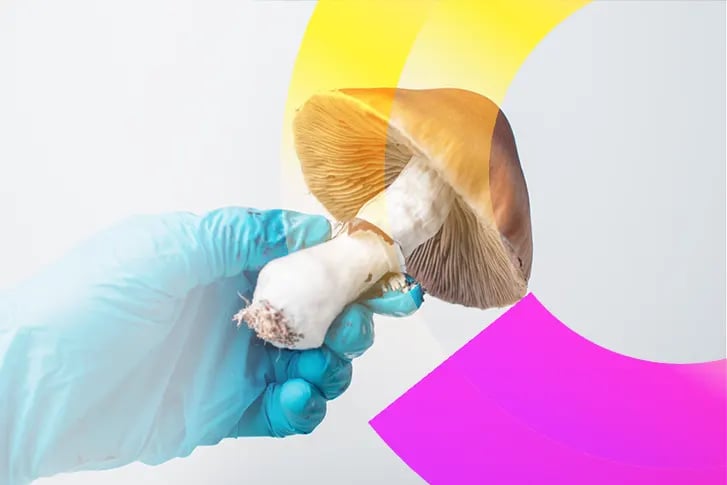The U.S. Food and Drug Administration (FDA) recently issued a draft guidance on the development of psychedelic drugs. There has been a growing interest in using psychedelics for the treatment of medical conditions in recent years, and this guidance by the FDA is timely to support researchers investigating this use. The guidance provides information on nonclinical programming, clinical trial design, and safety and efficacy considerations. According to the draft guidance, the term psychedelics refers to "classic psychedelics," typically understood to be drugs such as psilocybin and lysergic acid diethylamide (LSD) that act on the brain's serotonin system as well as "entactogens" or "empathogens" such as methylenedioxymethamphetamine (MDMA).
The FDA's draft guidance is intended to help researchers develop psychedelic drugs that are safe and effective for treating medical conditions including depression, anxiety, post-traumatic stress disorder (PTSD), and substance use disorders.
Here are some of the key takeaways from the FDA's draft guidance:
Nonclinical
Interestingly, the FDA recognizes there may be extensive information available on human exposure to psychedelics allowing Sponsors to initiate a clinical study under an Investigative New Drug (IND) Application without nonclinical toxicology data. Sponsors will be expected to provide studies to support chronic or chronic-intermittent dosing if the treatment effect is not durable and repeat dosing is anticipated. Moreover, Sponsors should take special consideration to assess functional activity at the 5-HT2B receptor subtype prior to clinical trials, as psychedelic drugs have serotonin (5-HT) activity and binding to the 5-HT2B receptor subtype has been linked to heart valvulopathy in humans.
Clinical Pharmacology
In line with the nonclinical consideration regarding 5-HT2B agonists, the FDA recommends excluding subjects who have preexisting valvulopathy or pulmonary hypertension from multiple-dose clinical studies until this risk can be better characterized. The FDA also listed known pharmacodynamic interactions to consider, such as chronic use of selective serotonin inhibitors or monoamine oxidase inhibitors. Sponsors are encouraged to exercise caution in characterizing the dose-response relationship for safety and efficacy and to evaluate food effect early in development on oral psychedelic drugs to inform clinical study design and potential labeling.
Abuse Potential Assessment
Psychedelic drugs will need to be evaluated for abuse potential during drug development as they act on the central nervous system, and several drugs under this category are already controlled under the Controlled Substances Act. Sponsors will need to follow specific regulations for psychedelic drugs that are Schedule I controlled substances including compliance with all applicable Drug Enforcement Administration (DEA) requirements (see 21 CFR 1301).
When available for controlled substances, researchers can use scientifically valid published investigations to support the abuse potential assessment. However, a human abuse potential study may not be necessary for certain psychedelic drugs to support the abuse potential assessment in a New Drug Application (NDA) when the subjective effects predictive of abuse are well characterized from clinical studies and robust epidemiological data exist to demonstrate that individuals are using the psychedelic drug for abuse purposes. The FDA recommends all animal and human abuse potential and dependence-related studies be conducted only after the therapeutic dose range is determined.
Clinical Safety and Efficacy
The requirement for adequate and well-controlled clinical (AWC) studies presents a challenge for psychedelic drugs, as the use of a traditional placebo as a control can be problematic for assessing efficacy. For example, subjects receiving the active drug may experience intense perceptual disturbances whereas those who receive a placebo expecting drug effects may instead experience a nocebo effect, which is worsening symptoms as a result of knowing they did not get the active treatment. Sponsors will need to design their studies appropriately to prevent functional unblinding and minimize bias since the study drug behavioral effects may be discernable to the study investigators and enrolled subjects. The draft guidance provides several recommendations on how to navigate study implementation, such as using video raters blinded to the treatment, subperceptual doses of a psychedelic drug as the control, and a complementary trial design.
Conclusion
In general, this guidance emphasizes that there is limited knowledge regarding psychedelic drugs for clinical use, so Sponsors will need to engage in thorough communication with the FDA during program development. The FDA is particularly concerned with the assessment of abuse potential and challenges with implementing AWC trials. Meanwhile, there is potential to use existing data on human exposure to allow psychedelic drug development without conducting animal toxicology studies. This is a significant step forward in the development of psychedelic drugs and provides a great starting point for researchers who are working to develop these drugs for medical use.
ProPharma's regulatory team can help you navigate the regulatory challenges facing your psychedelic drug. If you have questions, contact us today to connect with one of our regulatory experts.
